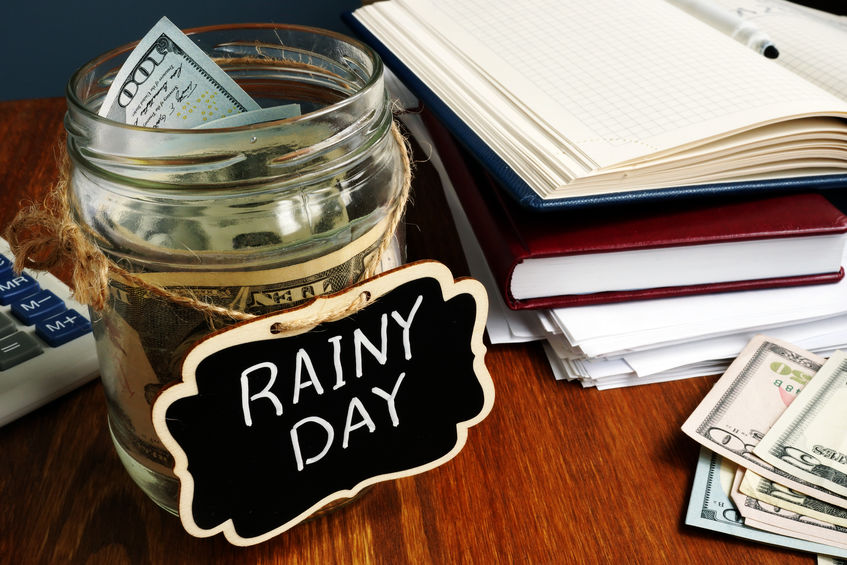The economic effect of the novel coronavirus pandemic illustrates how important it is to have an emergency fund.
Just a few months ago, jobless claims and the unemployment rate in the United States were at record lows. The stock market had record highs. The economy looked fantastic!
Then, overnight, everything changed. Businesses were forced to close. New jobless claims soared, and the unemployment rate spiked. Those still employed suddenly face a new level of uncertainty.
But you can be prepared. And the best way is to have an emergency fund.
What Is an Emergency Fund?
Experts recommend having at least three to six months’ worth of living expenses set aside in case of an emergency. I like to have at least six.
Set this money aside in a separate account and don’t commingle it with other funds. You don’t want to be tempted to use it for anything other than an emergency. (Buying new furniture before the in-laws come to town is not an emergency.)
Hold your emergency fund in a checking account, savings account, or money market account. Don’t invest it in the stock market or anything that puts the money at risk or difficult to access. Don’t worry about the rate of return here; that’s not what this money is for. It needs to be readily available for unexpected expenses.
Who Needs an Emergency Fund?
Having an emergency fund in place should always be a priority, even if everything is going well for you financially.
It’s easy to forget how important it is. When you feel secure in your job and confident in your ability to find future employment, you’re more likely to take on new financial commitments like buying a car or home. You may enjoy spending a little extra money on restaurants, entertainment, and travel.
Indulge in these things. You’ve earned it! But do not do these things while also overlooking the need to have an emergency fund.
When to Use an Emergency Fund
One of the main risks an emergency fund prepares you for is losing your job.
Job loss can happen at any time — not just during a national crisis. Losing your job is not fun, to say the least. But if you have an emergency fund, it doesn’t have to destroy you financially.
Having an emergency fund also gives you flexibility while looking for your next job. It can be difficult to find the right job with your desired salary. Without an emergency fund, you may find yourself in a desperate position where you have to accept the first job that becomes available rather than take your time finding the right position. Having a little financial security puts you in a stronger position to keep your career on track.
Even when you are gainfully employed, an emergency fund prepares you for the unexpected.
You or a family member could experience a medical emergency, and medical bills can be costly. With deductibles and copayments, you may suddenly find yourself with medical bills in the thousands of dollars.
You can also face unexpected home repairs. As a homeowner, you should always have regular repairs and maintenance built into your budget, but what about the unexpected expenses? What if the furnace breaks down in the middle of winter? That can’t wait until it fits into your budget. It has to be repaired or replaced immediately.
The same goes for car repairs.
The Freedom to Make Smart Financial Decisions
If you are not prepared for an emergency when one happens, you may make poor decisions to stay afloat.
One of the worst financial choices is going into debt over an emergency purchase. Borrowing is costly. It’s quick and easy to take out a credit card, but if you don’t have the money for unexpected expenses to start with, you’ll have difficulties paying the credit card bill when it comes due.
If you don’t pay credit cards off in full, you’re subject to interest and fees. And once you add that new financial obligation, it becomes even harder to build an emergency fund.
Another big mistake when dealing with unexpected expenses is to tap into your IRA or 401(k).
Avoid this option unless you are at risk of losing your home or facing bankruptcy. If you take money out of your retirement accounts prematurely, you risk not having enough money for retirement. Just think, If you don’t have money now in your working years, what are you going to do when you reach retirement age?
A withdrawal from your retirement accounts is also subject to taxes and penalties. For example, withdrawals from a traditional IRA are taxed as ordinary income, and if you are younger than 59 ½, you may also be subject to a 10% early-withdrawal penalty.
The IRS allows for penalty-free hardship distributions in some cases, but your hardship may not qualify. For example, a medical emergency may be exempt from taxes and penalties, but auto repairs may not be.
Having an emergency fund creates a buffer between you and your retirement accounts.
Reduce Financial Stress
The best reason to have an emergency fund is to reduce stress. Knowing that you’re prepared for a financial emergency can go a long way toward giving you peace of mind in your day-to-day life.
Sign up for my newsletter to receive future articles


This is a great article! I never saw the importance of an emergency fund when I was single. When I got married and had kids I knew that their protection meant the world to me and I needed to set one up and secure our future. I can’t imagine what I would’ve done if that wasn’t set today
Thank you. I appreciate your comments.